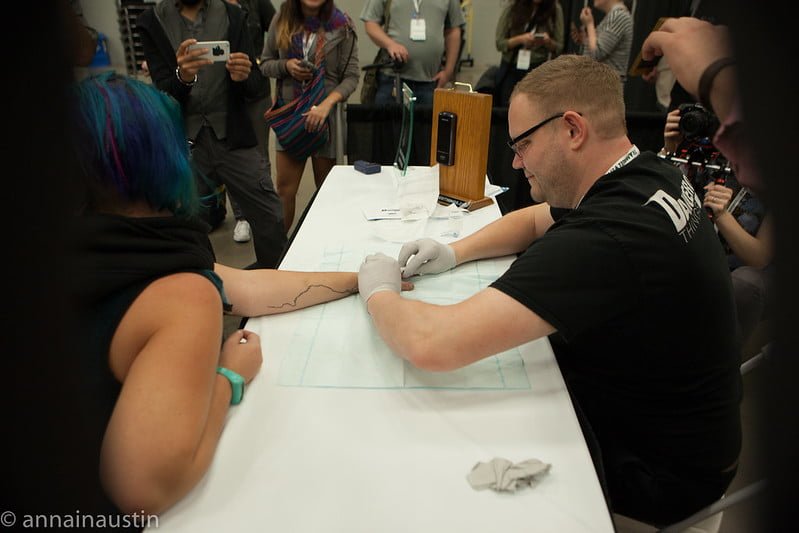Voice 1
Welcome to Spotlight. I’m Anne Muir.
Voice 2
And I’m Liz Waid. Spotlight uses a special English method of broadcasting. It is easier for people to understand, no matter where in the world they live.
Voice 3
“In August 1998, a silicon chip was put in my arm. This allowed a computer to watch me. My implant used radio waves to communicate with a network of antennas throughout the department. They sent the signals to a computer. It was programmed to respond to my actions. At the main entrance, a voice box said “Hello” when I entered. The computer sensed my movement through the building. It opened the door to my lab for me as I came near to it. It turned on the lights. For the nine days the implant was in place, I performed acts that seemed like magic simply by walking in a particular direction.”

Voice 1
Kevin Warwick wrote about this experiment with becoming part machine in WIRED magazine. He is a professor of Cybernetics at the University of Reading in England. The study of Cybernetics looks at controlling systems using technology. Warwick had a silicon chip called an implant.
Voice 2
There are many people interested in trying this kind of experiment called body hacking. These people want to change their bodies with technology. But there are many questions about it. Today’s Spotlight is on body hacking.
Voice 1
Humans have been making changes to their bodies for many years. Some people have mechanical implants for medical or health reasons. This technology can help their hearts work regularly, or help them to hear. Some people have replaced a missing body part, such as an arm or leg, with a mechanical one. As technology gets better, people can do more. But some people want to go even farther. Professor Kevin Warwick says:
Voice 3
“Since I was a child I have been interested in the study of robots and cyborgs. Now I am in a position where I can actually become one. I believe this desire – this wish to explore – is part of being human.”
Voice 2
Kevin Warwick became a cyborg when he had a computer implanted, or put into, his arm. A cyborg is a cybernetic organism. It is a being that is part human and part machine. This sounds like something from a story. But it is a part of life for a small group of people.
Voice 1
Amal Graafstra helps people add technology to their bodies. Graafstra mainly works with small chips or tags that contain electronically stored information. These are called RFID chips. They are as small as a grain of rice. People use them in many ways. They can be used to open doors or help find things that are lost, and many other ways. Graafstra has implanted RFID chips in himself and in many other people.
Voice 2
People changing their bodies with technology call themselves “body hackers.” Hacking is a way of breaking into something. Body hackers are exploring the relationship between the natural human body and technology. They try to make their bodies do things beyond what humans can usually do. Graafstra told the news organization NPR:
Voice 4
“Body hackers view the world differently. They believe technology has reached a point where it can improve the human body instead of just fixing what is broken. A patient may someday very soon come and say, ‘My eye is totally fine, but I want an eye that can see infrared. And I want an eye that can zoom.”

Voice 1
Body hacking takes all kinds of forms. People have put magnets underneath their skin. One man made his finger into a device that connects to computers. This drive stores information. Yet another man attached devices into his head to let him listen to music. Australian artist Professor Stelarc even attached an extra ear – to his arm. These are only a few of the ways that humans have tried to use technology to become “more” than human.
Voice 2
Neil Harbission from Spain was born with a problem with his eyes. He cannot see any colour except grey. So he had an implant made that “plays” colour for him. He has a camera attached to the back of his head. From this, a long curved antenna hangs in front of his face. It makes sound to let him know what colour things are as he sees them. The antenna works so well that Harbission can even see colours that other humans cannot. It is also connected to the internet. Harbisson no longer considers himself human at all. He calls himself a cyborg.

“Cyborg Neil Harbisson” (CC BY 2.0) by Campus Party Europe in Berlin
Voice 1
Harbission created the Cyborg Foundation. This organization educates people about cyborgs. Not everyone is happy about the cyborg movement. There are many difficult ideas to think about. Some people say that it is too dangerous. This is especially true when people implant machines into themselves without a doctor’s help.
Voice 2
There is a lot that is unknown about body hacking. No one can know what the result of some implants will be. Many people think that the mix of the human body and technology is too risky. Some body hackers have experienced extreme feelings of unexplained fear after getting their implants.
Voice 1
And some people simply believe that the human body should remain as it is. They think it is wrong to change the body from its natural state.
Voice 2
Richard Wordsworth is an expert in bioethics and bioterrorism. He says that technology is already very easy for people to use. He wonders why people would need to put machines INTO their bodies. He also asks about what happens when that technology becomes old. If a device is under a person’s skin, they will need to have surgery to upgrade it.
Voice 1
But Wordsworth also has other concerns – about safety. Could technology in our bodies actually make us more open to danger? What happens if someone hacks into a person? They could have a lot of power over a body. Wordsworth tells vice.com:
Voice 5
“I already give huge amounts of personal data over to my network provider. But with my phone I can unplug if I want to. I can turn off my handset and put it in a drawer. I could not do this as easily if the technology was buried somewhere in my arm.”
Voice 2
There are still only a few people who practice body hacking. Will body hacking become a larger movement? And is it worth the danger? For Kevin Warwick, the answer is easy. He tells WIRED:
Voice 3
“My entire team is working with me to bring humans and technology together in a way that has never been attempted. The excitement of looking into a new world – the world of cyborgs – is worth the risks.
Voice 1
The writer of this programme was Rena Dam. The producer was Michio Ozaki. The voices you heard were from the United Kingdom and the United States. All quotes were adapted for this programme and voiced by Spotlight. This programme is called ‘Body Hacking: More Than Human.’
Voice 2
You can also get our programmes delivered directly to your Android or Apple device through our free official ‘Spotlight English’ app. We hope you can join us again for the next Spotlight programme. Goodbye.
Question:
Would you put technology inside your body so that you could hear colors or see sound? How would you use technology to change your body’s abilities? Write your answer in the comments below.








Many thanks Team Spotlight. Everyday I try my best to read new lesson and learn new vocabulary. Sometimes I can’t connect website but i don’t know what happen.
I don’t put technology inside my body but i know someone does it to see , hear, discover,…. anything or healing their wound after accident.
I don’t use technology to change my body’s abilities except especialy case.
My answers are above, thank for your reading.
I hope you feel healthy, happy and have many new interesting subjects.
Best wishes for you.
Hola. Me gusta sus programas. Aprendo el inglés así como otros temas de actualidad. Desconocía del tema. Es sorprendente como crecemos pero no me gustaría tener chips o cosas extras en mi cuerpo, solo por ambiciones incorrectas. Gracias y éxitos.
I would have put technology inside my body if a part of my body had problemed, for instance, if I had had a terrible accident and I had lost my legs, I would have let a doctor to “add new mechanical legs”. Fist off all I would like to learn how to use what I have better, I mean I would like to write using my righ and left hand.
Yes I have a ACR implant in my knee . The doctor had a operation on my leg . Befor Operation I had pain but after that I do sport and Now I do’t have any pain . The thechnology help me to live beter.
Absolutely not I have a good healthy this moment but this technology is better for the people was born with a problem and thank you for this information
Yes. I would put technology inside my body so that I could see colors or hear sound. I think it will help me to improve the weak parts of myself. Help me feel life more fully thanks to modern technology.
Hello spotlight . I am rayyan from Jordan . i just want to say thanks for all these
Nice programs that helps me to get more new words and become more Fluency in English. And about the hacking I think I wii never put any implants in my body because iknow it is a big risk and maybe it will be too harmful .
At present, I think I didn’t need put technology inside your body so that I could hear colors or see sound. But, it come nature, one day I will need it. If I would use technology to change your body’s abilities, I had changed my legs. I want to my legs become are longer.
Put technology inside our body will have more useful but it also has some disadvantages. There is some technology inside such as tattoos, cosmetic surgery, and using technology to examine. With me, I don’t use technology inside my body unless using device technology to test my skin. The previous my skin has acne so I must use technology to check and now sometimes I also test periodically. I also limit the use of technology inside my body because I’m afraid of pain and I feel it is not necessary for my body.
I would have pu technology inside my body if a part of my body had problems.
I think I do not would to put technology inside my body if I do not need it, but also I think this technology is helps humans to improve them life and make it more easier.
Thank you so match Spotlight English!
I don’t know if the technology is better for our health, so I think that I don’t put technology inside my body but I think also is better for who born with a problem in your body and thanks for this information
Yes I would implant a technology into my body If it is used as a cure for a disease. The revolution of technology is a blessing.
No I prefer to be a natural person.
I do not know.